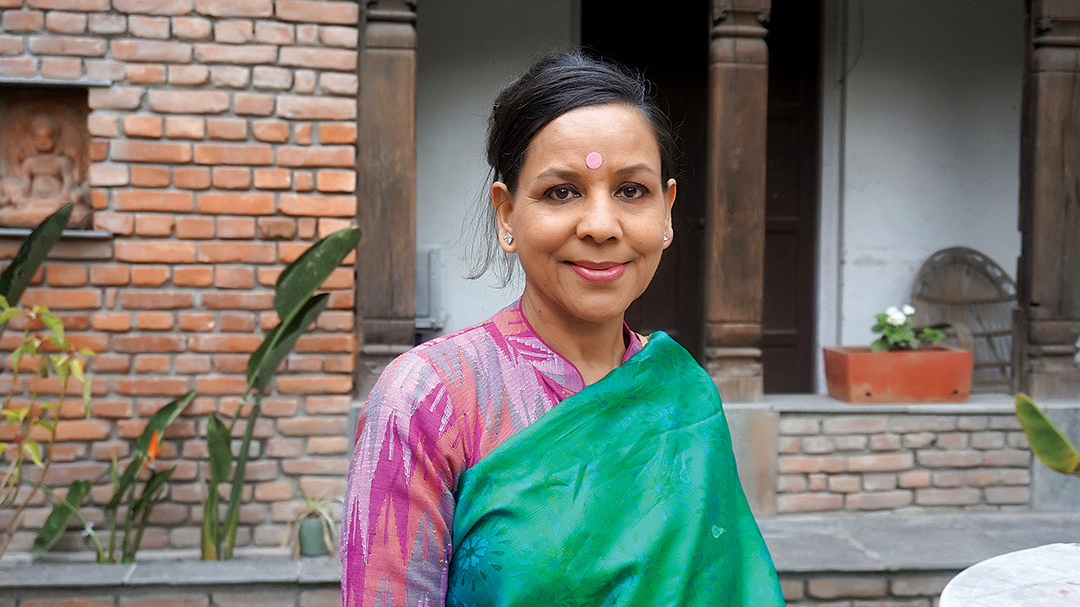
The term ‘tokenism’ has given rise to many discussions and debates for decades, yet we see one gender dominate the political and business landscape across the globe. The constitution of Nepal has a provision that guarantees 33% of the seats in the Parliament for women, but is that enough, is it a start, or is it an eyewash. Most people believe that this is inclusion based on compulsion rather than intent. Is it any different in the business landscape?
In this edition of Business 360, we spoke to three women leaders to learn their views on the subject. Here’s what they had to say:
 Tokenism, by definition, means only making a symbolic effort to avoid criticism and to look like you are doing your part to support a group of disadvantaged people by giving a few of them representation or position of prominence. However, it does not help those people significantly in the long run.
I think tokenism does more harm than good. We can take women’s status in Nepal as an example. The reality is that all power has been held by men at each and every level of the country, be it in bureaucracy, politics, business, academics or media. Women’s voices, concerns, perspectives are never at the decision-making tables. Even in matters most important to them, like citizenship in the name of a mother, women are controlled by the whip issued by men-controlled parties.
I think giving a woman the ceremonial position of a President is also a tokenism when the executive power is always with men. It only helps people who want to maintain the status quo to quip, ‘See! We’ve already made a WOMAN the Head of the State. You still need more women empowerment? The problem is solved. You are just overreacting.’
Without having many people in the team who have the same value system, be it in corporate boards or government or political positions or in media, even if one or two people land some positions, they won’t be able to drive their agenda and create substantial change. So, tokenism is not enough.
Long lasting change, real change, with the intent of solving the problem is what we need. And to change the mindsets within the corporate systems, political systems, or the society at large, media can play the most important role. I think it is high time media highlight and promote the leadership, achievements, stories of less-talked about leaders among women and historically marginalised and minority groups. Let’s start from there.
Tokenism, by definition, means only making a symbolic effort to avoid criticism and to look like you are doing your part to support a group of disadvantaged people by giving a few of them representation or position of prominence. However, it does not help those people significantly in the long run.
I think tokenism does more harm than good. We can take women’s status in Nepal as an example. The reality is that all power has been held by men at each and every level of the country, be it in bureaucracy, politics, business, academics or media. Women’s voices, concerns, perspectives are never at the decision-making tables. Even in matters most important to them, like citizenship in the name of a mother, women are controlled by the whip issued by men-controlled parties.
I think giving a woman the ceremonial position of a President is also a tokenism when the executive power is always with men. It only helps people who want to maintain the status quo to quip, ‘See! We’ve already made a WOMAN the Head of the State. You still need more women empowerment? The problem is solved. You are just overreacting.’
Without having many people in the team who have the same value system, be it in corporate boards or government or political positions or in media, even if one or two people land some positions, they won’t be able to drive their agenda and create substantial change. So, tokenism is not enough.
Long lasting change, real change, with the intent of solving the problem is what we need. And to change the mindsets within the corporate systems, political systems, or the society at large, media can play the most important role. I think it is high time media highlight and promote the leadership, achievements, stories of less-talked about leaders among women and historically marginalised and minority groups. Let’s start from there.
 Can ‘tokenism’ give women and minorities in business the competitive edge? When you delve into this question more and more you realise it’s about time to build an economy that works for everybody – women, men, marginalised communities and minorities.
Like many other sectors, women are inadequately represented in the business world and for a variety of cultural, societal and economic reasons they are left out unaided creating inequality, biasness and exploitation. A huge barrier still exists for women to be involved in business therefore we must build a robust system to support and sustain women’s participation in the business sector.
Women’s economic empowerment can happen only when women can equitably participate, contribute and benefit from economic opportunities. While we can begin with special incentives, facilities, tokenism or whatever we may call it – that will not be sufficient. All sectors at every level need to work on this. While the government agencies need to pass laws and regulations that support women’s businesses, the private sector has to help with networking. Most importantly, women themselves need to forge ahead with the unique skills they have.
The competitive edge lies in the nexus of all these factors coming together, with women taking their business ahead.
Can ‘tokenism’ give women and minorities in business the competitive edge? When you delve into this question more and more you realise it’s about time to build an economy that works for everybody – women, men, marginalised communities and minorities.
Like many other sectors, women are inadequately represented in the business world and for a variety of cultural, societal and economic reasons they are left out unaided creating inequality, biasness and exploitation. A huge barrier still exists for women to be involved in business therefore we must build a robust system to support and sustain women’s participation in the business sector.
Women’s economic empowerment can happen only when women can equitably participate, contribute and benefit from economic opportunities. While we can begin with special incentives, facilities, tokenism or whatever we may call it – that will not be sufficient. All sectors at every level need to work on this. While the government agencies need to pass laws and regulations that support women’s businesses, the private sector has to help with networking. Most importantly, women themselves need to forge ahead with the unique skills they have.
The competitive edge lies in the nexus of all these factors coming together, with women taking their business ahead.
 Tokenism means only a symbolic representation without any meaningful participation. What we are looking for here is not only a numeric increase of women in businesses. We want an inclusive process where women are not just recruited to diversify the numeric ratios but are provided with the space and psychological safety to be in leadership and decision-making roles where they can influence policies and decisions.
Having more women and non-binary individuals in business is the first step, and we need to move beyond the numbers and work towards having more women and non-binary individuals in decision-making, policy-making committees, and teams where their opinions and experiences are meaningfully represented.
When it comes to having gender diversity in the business, it should focus on creating frameworks, processes, and mindsets that provide a space for women and non-binary individuals to grow, thrive, and advance upwards! It should not be a mere facade to avoid criticism and set an impression of being inclusive!
READ ALSO:
Tokenism means only a symbolic representation without any meaningful participation. What we are looking for here is not only a numeric increase of women in businesses. We want an inclusive process where women are not just recruited to diversify the numeric ratios but are provided with the space and psychological safety to be in leadership and decision-making roles where they can influence policies and decisions.
Having more women and non-binary individuals in business is the first step, and we need to move beyond the numbers and work towards having more women and non-binary individuals in decision-making, policy-making committees, and teams where their opinions and experiences are meaningfully represented.
When it comes to having gender diversity in the business, it should focus on creating frameworks, processes, and mindsets that provide a space for women and non-binary individuals to grow, thrive, and advance upwards! It should not be a mere facade to avoid criticism and set an impression of being inclusive!
READ ALSO:
Shilshila Acharya
Director, Avni Centre for Sustainability
 Tokenism, by definition, means only making a symbolic effort to avoid criticism and to look like you are doing your part to support a group of disadvantaged people by giving a few of them representation or position of prominence. However, it does not help those people significantly in the long run.
I think tokenism does more harm than good. We can take women’s status in Nepal as an example. The reality is that all power has been held by men at each and every level of the country, be it in bureaucracy, politics, business, academics or media. Women’s voices, concerns, perspectives are never at the decision-making tables. Even in matters most important to them, like citizenship in the name of a mother, women are controlled by the whip issued by men-controlled parties.
I think giving a woman the ceremonial position of a President is also a tokenism when the executive power is always with men. It only helps people who want to maintain the status quo to quip, ‘See! We’ve already made a WOMAN the Head of the State. You still need more women empowerment? The problem is solved. You are just overreacting.’
Without having many people in the team who have the same value system, be it in corporate boards or government or political positions or in media, even if one or two people land some positions, they won’t be able to drive their agenda and create substantial change. So, tokenism is not enough.
Long lasting change, real change, with the intent of solving the problem is what we need. And to change the mindsets within the corporate systems, political systems, or the society at large, media can play the most important role. I think it is high time media highlight and promote the leadership, achievements, stories of less-talked about leaders among women and historically marginalised and minority groups. Let’s start from there.
Tokenism, by definition, means only making a symbolic effort to avoid criticism and to look like you are doing your part to support a group of disadvantaged people by giving a few of them representation or position of prominence. However, it does not help those people significantly in the long run.
I think tokenism does more harm than good. We can take women’s status in Nepal as an example. The reality is that all power has been held by men at each and every level of the country, be it in bureaucracy, politics, business, academics or media. Women’s voices, concerns, perspectives are never at the decision-making tables. Even in matters most important to them, like citizenship in the name of a mother, women are controlled by the whip issued by men-controlled parties.
I think giving a woman the ceremonial position of a President is also a tokenism when the executive power is always with men. It only helps people who want to maintain the status quo to quip, ‘See! We’ve already made a WOMAN the Head of the State. You still need more women empowerment? The problem is solved. You are just overreacting.’
Without having many people in the team who have the same value system, be it in corporate boards or government or political positions or in media, even if one or two people land some positions, they won’t be able to drive their agenda and create substantial change. So, tokenism is not enough.
Long lasting change, real change, with the intent of solving the problem is what we need. And to change the mindsets within the corporate systems, political systems, or the society at large, media can play the most important role. I think it is high time media highlight and promote the leadership, achievements, stories of less-talked about leaders among women and historically marginalised and minority groups. Let’s start from there.
Neeru Rayamajhi Khatri
President, Federation of Woman Entrepreneurs Associations of Nepal
 Can ‘tokenism’ give women and minorities in business the competitive edge? When you delve into this question more and more you realise it’s about time to build an economy that works for everybody – women, men, marginalised communities and minorities.
Like many other sectors, women are inadequately represented in the business world and for a variety of cultural, societal and economic reasons they are left out unaided creating inequality, biasness and exploitation. A huge barrier still exists for women to be involved in business therefore we must build a robust system to support and sustain women’s participation in the business sector.
Women’s economic empowerment can happen only when women can equitably participate, contribute and benefit from economic opportunities. While we can begin with special incentives, facilities, tokenism or whatever we may call it – that will not be sufficient. All sectors at every level need to work on this. While the government agencies need to pass laws and regulations that support women’s businesses, the private sector has to help with networking. Most importantly, women themselves need to forge ahead with the unique skills they have.
The competitive edge lies in the nexus of all these factors coming together, with women taking their business ahead.
Can ‘tokenism’ give women and minorities in business the competitive edge? When you delve into this question more and more you realise it’s about time to build an economy that works for everybody – women, men, marginalised communities and minorities.
Like many other sectors, women are inadequately represented in the business world and for a variety of cultural, societal and economic reasons they are left out unaided creating inequality, biasness and exploitation. A huge barrier still exists for women to be involved in business therefore we must build a robust system to support and sustain women’s participation in the business sector.
Women’s economic empowerment can happen only when women can equitably participate, contribute and benefit from economic opportunities. While we can begin with special incentives, facilities, tokenism or whatever we may call it – that will not be sufficient. All sectors at every level need to work on this. While the government agencies need to pass laws and regulations that support women’s businesses, the private sector has to help with networking. Most importantly, women themselves need to forge ahead with the unique skills they have.
The competitive edge lies in the nexus of all these factors coming together, with women taking their business ahead.
Amuda Mishra
Founder and Executive Director, Ujyalo Foundation
 Tokenism means only a symbolic representation without any meaningful participation. What we are looking for here is not only a numeric increase of women in businesses. We want an inclusive process where women are not just recruited to diversify the numeric ratios but are provided with the space and psychological safety to be in leadership and decision-making roles where they can influence policies and decisions.
Having more women and non-binary individuals in business is the first step, and we need to move beyond the numbers and work towards having more women and non-binary individuals in decision-making, policy-making committees, and teams where their opinions and experiences are meaningfully represented.
When it comes to having gender diversity in the business, it should focus on creating frameworks, processes, and mindsets that provide a space for women and non-binary individuals to grow, thrive, and advance upwards! It should not be a mere facade to avoid criticism and set an impression of being inclusive!
READ ALSO:
Tokenism means only a symbolic representation without any meaningful participation. What we are looking for here is not only a numeric increase of women in businesses. We want an inclusive process where women are not just recruited to diversify the numeric ratios but are provided with the space and psychological safety to be in leadership and decision-making roles where they can influence policies and decisions.
Having more women and non-binary individuals in business is the first step, and we need to move beyond the numbers and work towards having more women and non-binary individuals in decision-making, policy-making committees, and teams where their opinions and experiences are meaningfully represented.
When it comes to having gender diversity in the business, it should focus on creating frameworks, processes, and mindsets that provide a space for women and non-binary individuals to grow, thrive, and advance upwards! It should not be a mere facade to avoid criticism and set an impression of being inclusive!
READ ALSO:
Published Date: February 16, 2022, 12:00 am
Post Comment
E-Magazine
RELATED Opinion





